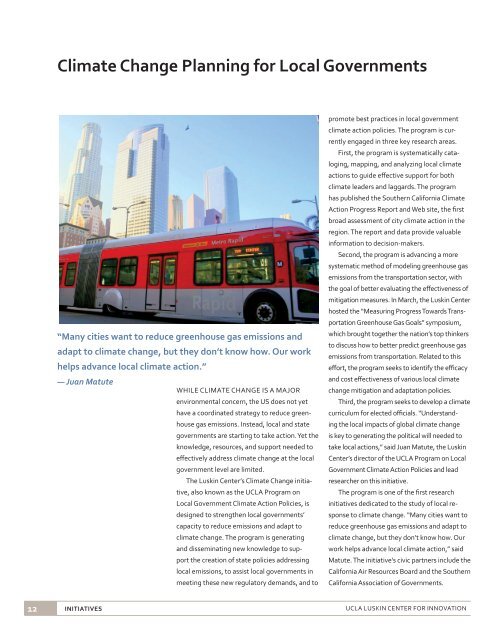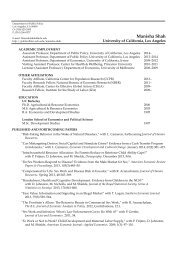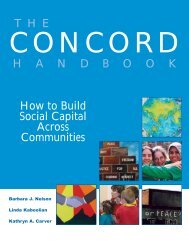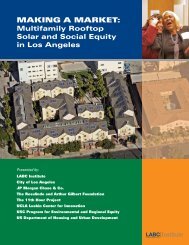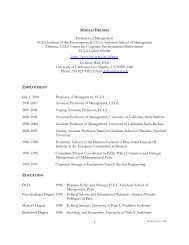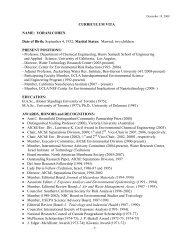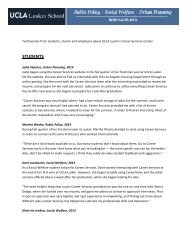Director's Report 2011.pdf - UCLA Luskin School of Public Affairs
Director's Report 2011.pdf - UCLA Luskin School of Public Affairs
Director's Report 2011.pdf - UCLA Luskin School of Public Affairs
You also want an ePaper? Increase the reach of your titles
YUMPU automatically turns print PDFs into web optimized ePapers that Google loves.
Climate Change Planning for Local Governments<br />
“Many cities want to reduce greenhouse gas emissions and<br />
adapt to climate change, but they don’t know how. Our work<br />
helps advance local climate action.”<br />
— Juan Matute<br />
While climate change is a major<br />
environmental concern, the US does not yet<br />
have a coordinated strategy to reduce greenhouse<br />
gas emissions. Instead, local and state<br />
governments are starting to take action. Yet the<br />
knowledge, resources, and support needed to<br />
effectively address climate change at the local<br />
government level are limited.<br />
The <strong>Luskin</strong> Center’s Climate Change initiative,<br />
also known as the <strong>UCLA</strong> Program on<br />
Local Government Climate Action Policies, is<br />
designed to strengthen local governments’<br />
capacity to reduce emissions and adapt to<br />
climate change. The program is generating<br />
and disseminating new knowledge to support<br />
the creation <strong>of</strong> state policies addressing<br />
local emissions, to assist local governments in<br />
meeting these new regulatory demands, and to<br />
promote best practices in local government<br />
climate action policies. The program is currently<br />
engaged in three key research areas.<br />
First, the program is systematically cataloging,<br />
mapping, and analyzing local climate<br />
actions to guide effective support for both<br />
climate leaders and laggards. The program<br />
has published the Southern California Climate<br />
Action Progress <strong>Report</strong> and Web site, the first<br />
broad assessment <strong>of</strong> city climate action in the<br />
region. The report and data provide valuable<br />
information to decision-makers.<br />
Second, the program is advancing a more<br />
systematic method <strong>of</strong> modeling greenhouse gas<br />
emissions from the transportation sector, with<br />
the goal <strong>of</strong> better evaluating the effectiveness <strong>of</strong><br />
mitigation measures. In March, the <strong>Luskin</strong> Center<br />
hosted the “Measuring Progress Towards Transportation<br />
Greenhouse Gas Goals” symposium,<br />
which brought together the nation’s top thinkers<br />
to discuss how to better predict greenhouse gas<br />
emissions from transportation. Related to this<br />
effort, the program seeks to identify the efficacy<br />
and cost effectiveness <strong>of</strong> various local climate<br />
change mitigation and adaptation policies.<br />
Third, the program seeks to develop a climate<br />
curriculum for elected <strong>of</strong>ficials. “Understanding<br />
the local impacts <strong>of</strong> global climate change<br />
is key to generating the political will needed to<br />
take local actions,” said Juan Matute, the <strong>Luskin</strong><br />
Center’s director <strong>of</strong> the <strong>UCLA</strong> Program on Local<br />
Government Climate Action Policies and lead<br />
researcher on this initiative.<br />
The program is one <strong>of</strong> the first research<br />
initiatives dedicated to the study <strong>of</strong> local response<br />
to climate change. “Many cities want to<br />
reduce greenhouse gas emissions and adapt to<br />
climate change, but they don’t know how. Our<br />
work helps advance local climate action,” said<br />
Matute. The initiative’s civic partners include the<br />
California Air Resources Board and the Southern<br />
California Association <strong>of</strong> Governments.<br />
12 INITIATIVES<br />
<strong>UCLA</strong> <strong>Luskin</strong> Center for Innovation


